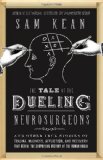new book – ‘The Custom-Made Brain: Cerebral Plasticity, Regeneration, and Enhancement’ by Jean-Didier Vincent and Pierre-Marie Lledo
June 26, 2014
The Custom-Made Brain: Cerebral Plasticity, Regeneration, and Enhancement by Jean-Didier Vincent and Pierre-Marie Lledo (Columbia University Press, 2014)
(kindle ed.), (amazon.co.uk), (UK kindle ed.)
Book description from the publisher:
Two leading neuroscientists introduce the concepts of “cerebral plasticity” and the “regenerating brain,” describing what we know now about the processes through which the brain constantly reconstructs itself and the potential benefits this knowledge could have in addressing concerns for neurological, cognitive, and emotional health.
The authors begin with a survey of the fundamental scientific developments that led to our current understanding of the regenerative mind, elucidating the breakthrough neurobiological studies that paved the way for our present understanding of the brain’s plasticity and regenerative capabilities. They then discuss the application of these findings to such issues as depression, dyslexia, schizophrenia, and cognitive therapy, incorporating the latest technologies in neuroimaging, optogenetics, and nanotechnology. Their work shows the brain is anything but a static organ, ceasing to grow as human beings become adults. Rather, the brain is dynamic, evolving organically in relation to physical, cultural, historical, and affective stimuli, a plasticity that provides early hope to survivors of trauma and degenerative disorders.





